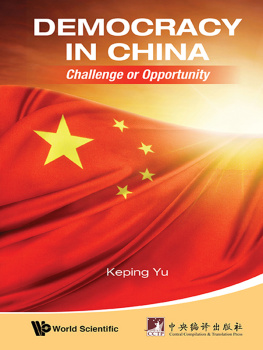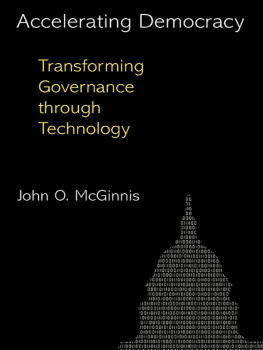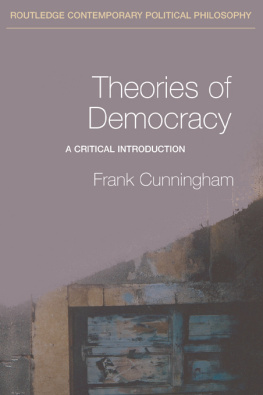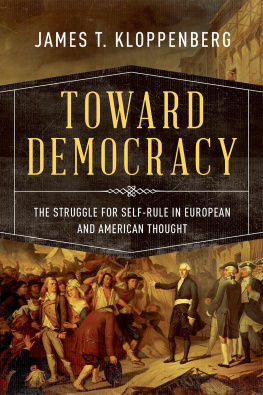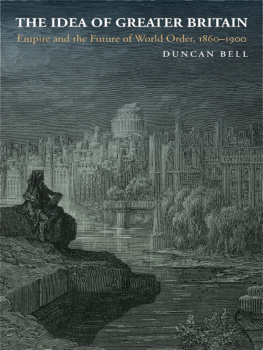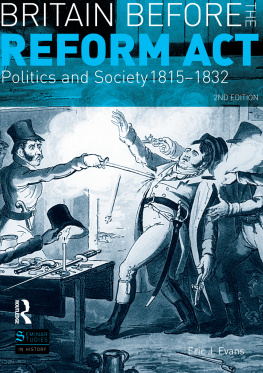THE CHALLENGE OF DEMOCRACY
NEW HISTORY OF BRITAIN
SERIES EDITOR: ERIC EVANS
THE CHALLENGE OF DEMOCRACY
Britain 18321918
HUGH CUNNINGHAM
First published 2001 by Pearson Education Limited
Published 2014 by Routledge
2 Park Square, Milton Park, Abingdon, Oxon OX14 4RN
711 Third Avenue, New York, NY 10017, USA
Routledge is an imprint of the Taylor & Francis Group, an informa business
Copyright 2001, Taylor & Francis.
The right of Hugh Cunningham to be identified as Author of this Work has been asserted by him in accordance with the Copyright, Designs and Patents Act 1988.
All rights reserved. No part of this book may be reprinted or reproduced or utilised in any form or by any electronic, mechanical, or other means, now known or hereafter invented, including photocopying and recording, or in any information storage or retrieval system, without permission in writing from the publishers.
Notices
Knowledge and best practice in this field are constantly changing. As new research and experience broaden our understanding, changes in research methods, professional practices, or medical treatment may become necessary.
Practitioners and researchers must always rely on their own experience and knowledge in evaluating and using any information, methods, compounds, or experiments described herein. In using such information or methods they should be mindful of their own safety and the safety of others, including parties for whom they have a professional responsibility.
To the fullest extent of the law, neither the Publisher nor the authors, contributors, or editors, assume any liability for any injury and/or damage to persons or property as a matter of products liability, negligence or otherwise, or from any use or operation of any methods, products, instructions, or ideas contained in the material herein.
ISBN: 978-0-582-31304-0 (pbk)
British Library Cataloguing in Publication Data
A CIP catalogue record for this book can be obtained from the British Library
Library of Congress Cataloging in Publication Data
A CIP catalog record for this book can be obtained from the Library of Congress
Typeset in 11/13pt Baskerville by Graphicraft Limited, Hong Kong
A New History of Britain aims to present students and general readers with authoritative accounts of British history from medieval times to the present day. British history series are not uncommon, of course, but this new Longman Series seeks to make a distinctive contribution. First, it is designed for use in the early part of the twenty-first century. This apparently obvious statement nevertheless has important resonance since it enables authors to reflect important contemporary debates about the nature of Britain in their writing. Not only will the books in this Series explain developments within, and relations between, the states which eventually came together as a United Kingdom with English history treated as part of British history rather than, as so often in the past, a complacent synonym for it. They will also address important issues of identity both internally and in examining Britains changing role in European and world affairs.
Second, unlike many recent texts, the Series makes a point of incorporating historical narrative, either underpinning the total structure or threaded through it as the author finds most effective. These narratives will not be excessively detailed and they will enable readers to retain a sense of the big picture. Narrative was unduly, even bemusingly, undervalued in much historical writing of the late twentieth century and the losses have been substantial. Many historical debates have taken place exclusively, rather than inclusively (within the Academy is the somewhat pompous phrase) and too many historians seem to have forgotten the critical importance of connection with a wider audience. History remains endlessly fascinating but the writing of some recent historians has been considerably less so. Historians punch their full weight only when they are widely read. This Series hopes to reassert the primacy of lively exposition. It will not talk down to its readers but it will connect with them. Cogent elucidation of the unfolding pattern of events is the key to wider historical understanding and the Series thus places a high premium on effective communication to a wide audience. Readers will get a flavour of the key debates and will understand how historians priorities have changed. However, they will understand these debates within a broader framework which encompasses the story of key events and developments and also the most important themes relevant to the periods chosen.
The main focus of the books will be on political history but not on political history narrowly conceived. One of the gains of historical scholarship in the last half century has been the recognition that high politics does not exist in some esoteric power vacuum. Indeed, the very phrase high politics is now almost never encountered. This is because historians, having given due weight to economic, social, intellectual and cultural history as fashions and other disciplines made their impact, have become increasingly aware of the need to pull strands together and to offer more total explanations of the key changes in governments and in the structures of power.
These volumes, then, provide readers with accessible and lively but authoritative accounts and interpretations written by leading scholars. They will be anything but mechanical; the authors priorities and personalities will decisively shape each book. All volumes, however, share the over-riding concern to provide up-to-date studies, which guide readers to a clear understanding of the main issues and developments while maintaining, or fostering, their interest and enthusiasm for History.
Eric J. Evans,
Series Editor
My thanks to John Gardiner and Eric Evans for their very helpful comments on earlier drafts. A book of this kind draws heavily for information and interpretation on the work of other historians. I have tried, but doubtless inadequately, to acknowledge that debt in notes and bibliography.
In 1833 the poet William Wordsworth, his radical youth now far behind him, stood in front of Lowther Castle in Westmorland, a massive construction built in 1806 and a symbol of the power of the aristocratic Lowther family. Reflecting on recent events, and especially the 1832 Reform Act, Wordsworth was despondent about the future for such families and their buildings. Hourly the democratic torrent swells, he lamented. Wordsworth was by no means alone in viewing the prospect of democracy with foreboding. The word carried the same kind of charge as communism at the height of the Cold War, signifying to many the destruction of private property and the overthrow of the social order and established institutions. It summoned up images of the mob violence of the French Revolution. Wordsworths torrent in fact turned out to be more like a meandering stream, often hardly perceptible in times of drought, and quite uncertain of its direction. It was not until 1918 that Britain came close to being a democracy as we now understand the word: in that year all adult men and adult women aged 30 and over were entitled to vote in general elections which had to be held at least every five years; and since 1911 the House of Lords, the location of hereditary aristocratic power, could delay a bill passed by the House of Commons for two years, but could not veto it outright.


